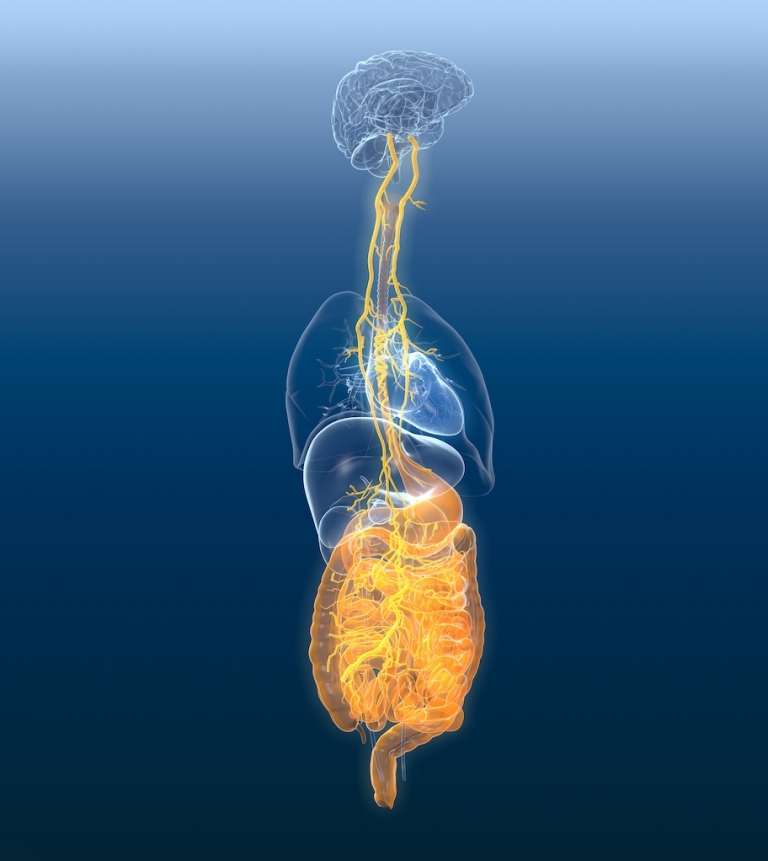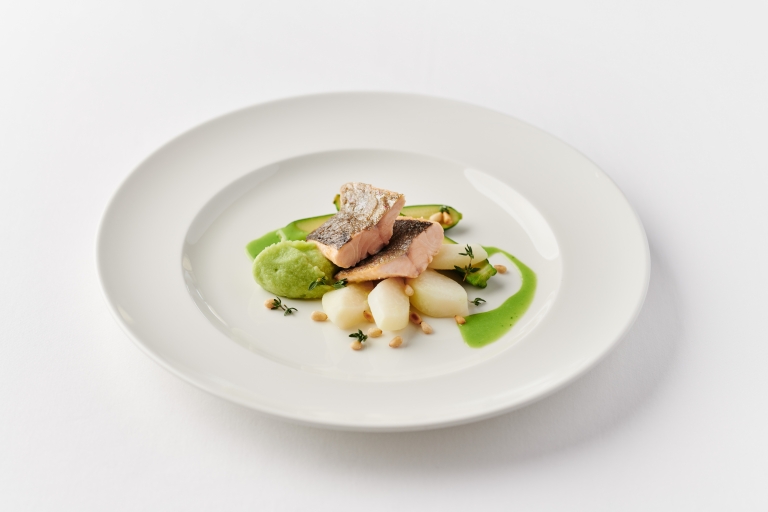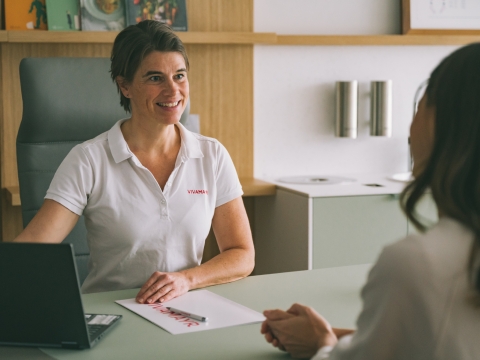Take courage
How your gut can help you have a more resilient mind
You probably know one of those people: the kind that is almost never fazed by anything. A lighthouse in the storm who seems to overcome the hurdles of everyday life with ease. Perhaps this person simply has a fantastically healthy gut? VIVAMAYR psychologist Mag. Claudia Kohla lets us in on how we can all find our way to mental resilience via the gut and why this requires a good dose of courage.
Mental resilience starts in the gut
Your intestine reaches a total length of around seven meters, making it the largest internal organ in the human body. Although it only measures a few centimeters in diameter, it is wound around multiple times and has around four million villi that absorb and transport nutrients to the blood and lymph. For this process to take place, food remains in the small intestine for up to nine hours, and up to an incredible 30 hours in the large intestine. If you were to take the villi, or the mucous membrane of the intestine as a whole, and spread it out, it would cover a surface area of 400 to 500 square meters.

It sounds like a true marvel, carrying out vital tasks to keep us alive every single day. Therefore, it should come as no surprise that our intestinal health plays a crucial role in our well-being and overall health, both mentally and physically.
“What’s fascinating is that our gut is connected to our brain via what’s known as the vagus nerve. On the one hand, it plays a part in rapid, intense decisions that quite literally ‘come from the gut’. And on the other, the vagus nerve is also directly involved in calming us down, meaning that it is instrumental in determining how well we deal with stressful situations”, explains Claudia Kohla, psychologist at the VIVAMAYR Health Resort Maria Wörth in Carinthia. “This is the nerve that also reflects the health of the gut in our mental resilience.” However, the vagus nerve is merely the interface between gut and brain. In fact, it is actually the millions of nerve cells that line the entire gastrointestinal tract in the form of a complex network known as the enteric nervous system that transmit information to the brain. A sizeable 90 percent of this information is transmitted unconsciously. Although these signals contribute to conscious sensations such as hunger, the urge to empty your bowels or a feeling of well-being, they also influence emotional and cognitive processes, which mostly occur without us realizing.
The enteric nervous system is an autonomous nervous system that regulates the secretion of the digestive juices and the movements of the digestive tract completely independently. Even though it is not directly linked to the central or peripheral nervous system, it is still influenced by these by way of other points of connection such as the vagus nerve.
The influence of emotions on the gut and our mental resilience
“The vagus nerve begins to form at a very young age. During this process, it is strengthened in particular by the quality of the bond between the parents and the child. If this bond is characterized by love, trust and a feeling of being well cared for, the nerve develops into a strong strand. If the early childhood years are predominantly marked by feelings of being lost and alone, the development of the nerve is weaker. Both of these scenarios have a corresponding effect on mental resilience later on”, explains Ms. Kohla, detailing how, “The gut actually has a large number of oxytocin receptors. Oxytocin is well-known as the “cuddle hormone” that reinforces the emotional bond between living beings. While the body is still developing, a lack of oxytocin can lead to an abnormal formation of the gut. For this reason, good early bonding between parent and child is crucial for a strong vagus nerve and high mental resilience.”

Coming to terms with trauma as the key to mental resilience
“Although the vagus nerve can be strengthened using relaxation techniques such as autogenic training and meditation, if emotional trauma from early childhood is present, these techniques will merely scratch the surface.” The expert is referring here to the immense significance of emotional health, which has a major influence on the gut and, therefore, on our overall health. Many people carry around traumas from the past. A lot of these are unconscious, and only come to the surface in situations that put us under pressure, for example, or that trigger negative stress in other ways. If this emotional pressure builds up inside us, it will have an effect on our organs, sooner or later. They exhibit increased strain, which in turn impairs their proper functioning. “If we then use physical treatments or mental techniques to attend to our gut, this is good for treating symptoms but doesn’t address the root cause of the emotional trauma”, Ms. Kohla explains. “Only by decoupling the emotions from the gut in therapy can the cause be remedied and the trauma thus overcome.” This allows the gut to develop healthily and a high level of mental resilience to be established.
Mental resilience: the easiest thing in the world?
Now we are well aware of the connections and the solution is clear too – so becoming emotionally balanced and mentally resilient should be child’s play, right? Unfortunately, it’s not quite as simple as it sounds, particularly because coping with emotional traumas is no easy feat. As already mentioned, traumas normally exist subconsciously, which requires appropriate methods of diagnosis. For example, biofeedback methods can help to detect negative stress in the body, but cannot detect the specific location of this stress. To do this, techniques such as autonomic response testing are needed, which includes muscle testing. This method is very effective for getting to the bottom of emotional traumas. However, you have to be very courageous to give this technique a go.

“From experience, many people are often not – or at least not yet – prepared to examine a health issue from an emotional perspective, since this is quite simply painful. Processing unconscious grievances or emotional shocks in order to ultimately resolve them demands courage and the willpower to face the unknown and look this emotional pain right in the eye”, Ms. Kohla explains. Yet this work is truly essential, after all, “The mind and the body are inextricably linked to one another; they impact and complement each another. And our emotional are incredibly powerful. In fact, they are an even greater force than our body. Ultimately, the physical form is simply an expression of that which has accumulated emotionally and has not been adequately processed”, says Ms. Kohla, emphasizing the enormous significance of the psyche.
Proper nutrition for the gut and a strong mind
Breaking down food and absorbing nutrients into the body occurs mainly in the small intestine, via the blood-gut barrier. This must be kept healthy to ensure that the intestine can carry out these tasks. A healthy diet is the most important thing here. Mag. Kohla especially recommends green vegetables, protein sources such as chicken or turkey, locally caught fish, berries, cashew nuts and sheep’s cheese products. In addition to protein, chicken and turkey meat also contains tryptophan, which is a precursor to the hormones serotonin and dopamine in the body. These are very important for our happiness and motivation. Omega-3 fatty acids keep the cells healthy and have some of the responsibility for ensuring the intestinal mucosa function smoothly. The most biologically active forms of omega-3 fatty acids are EPA (eicosapentaenoic acid) and DHA (docosahexaenoic acid). These can be found mainly in salmon, herring and mackerel, as well as in flax seeds and walnut oil.
Conversely, a high calorie intake and consuming foods that are high in sugar and low in nutrients attack the blood-gut barrier and can cause holes to develop in the intestine, which is known as “leaky gut syndrome”. This makes the gut more permeable for pathogens and toxins and more susceptible to food intolerances. Aside from this, a further consequence of the syndrome is that certain foods can no longer be sufficiently digested, which can in fact trigger intolerances. This also benefits the harmful bacterial colonization of the gut. But this can also be influenced by internal stressors, such as emotional traumas.
Ultimately, just how much “naughty” food is permitted in your diet depends on the basic constitution in your gut. However, good social bonding and a loving environment support gut health as much as an enjoyable and mindful culture around eating. “Make sure that you don’t consume any raw fruits or vegetables after 17:00 at the latest. This puts a strain on the gut and leads to an increase in fermentation and decaying processes. You should also put your phone away when you eat, take time to enjoy your meal in a relaxed setting and be conscious of your chewing”, the psychologist advises. “Because all of this has an effect on how well you are able to tolerate, digest and utilize the food.”

Mental resilience also comes from exercise
Whether it’s plenty of outdoor exercise, targeted specific training or fun sports: ultimately, all kinds of exercise have a positive effect on our body’s system as a whole and contribute in particular to a healthy gut. This is because exercise stimulates the circulation as well as the lymphatic system. “Besides the blood, the lymph is the most important transport system in our body. It specializes in digesting and disposing of bacteria, dead cells, indigestible foreign matter, fats and metabolic waste products. Yet exercise alone stimulates lymph circulation and keeps it flowing”, Ms. Kohla explains. For this reason, a lack of movement can lead to blockages in the lymph. However, emotional blockages can also be reflected in disruptions to the flow of the lymph, which fosters the development of diseases. “What’s more, movement also results in deeper breathing, which activates the vagus nerve, therefore relaxing the body and promoting a feeling of mental calmness.
After all, the mind and the body are one. You can never separate one from the other or treat them separately and expect health problems to be completely cured in this way. To achieve holistic health, it’s always necessary to consider the body and the mind equally”, Ms. Kohla says in summary.
At VIVAMAYR, conventional and complementary medicine approaches go hand in hand. As well as educating guests about a healthy eating culture, exercise concepts and mental techniques also have their place when it comes to promoting holistic health. Would you like to find out which of our medical VIVAMAYR programs is best suited to you? Simply send us a request – we look forward to getting to know you!
You can find selected products in our online shop to incorporate the VIVAMAYR lifestyle at home.

Sources
N.p., n.d., Dünndarm – Aufbau und Funktion [Small intestine – structure and function] (German language), accessed 30.3.2021, 10:45
Rudolf-Müller Eva, 9.8.2016, Verdauung [Digestion] (German language), accessed 30.3.2021, 10:40
N.p., n.d., Enterisches Nervensystem [Enteric nervous system] (German language), accessed 30.3.2021, 11:30










